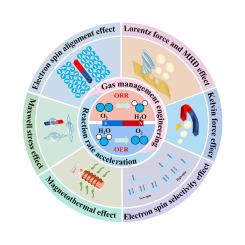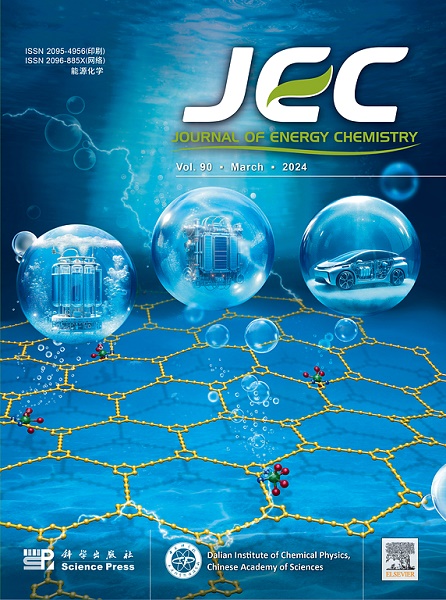利用磁场增强氧电催化
IF 14.9
1区 化学
Q1 Energy
引用次数: 0
摘要
磁场提供了一种非侵入性的策略来调节氧电催化,但对其潜在机制的清晰和统一的理解仍然具有挑战性。本文综述了磁电催化效应的系统分类,包括气体管理工程和反应速率加速,并总结了该领域的最新研究进展。此外,这篇综述提供了一个重要的评价盛行的机制理论。具体来说,我们强调了磁电阻效应无法解释磁增强的明显pH依赖性。此外,我们深入讨论了围绕电子自旋选择性效应的持续争论,质疑其普遍有效性。我们还强调了一些关键的突破,特别是区域壁消除和增强催化活性之间的关系。这篇综述还讨论了解耦共存磁效应的关键实验挑战,强调了必要的实验程序,旨在区分宏观的、磁流体动力驱动的对流和内在的、自旋介导的动力学增强。最后,提出了未来的发展方向,主要取决于磁场与其他外部场(如电场、光子场或热场)的战略整合,以解锁新的催化途径并精确地引导反应的选择性和效率。本文章由计算机程序翻译,如有差异,请以英文原文为准。

Harnessing magnetic fields for oxygen electrocatalysis enhancement
Magnetic fields offer a non-invasive strategy to modulate oxygen electrocatalysis, but a clear and unified understanding of the underlying mechanisms still remains challenging. This review provides a systematic classification of magneto-electrocatalytic effects, including gas management engineering and reaction rate acceleration, and summarizes the latest research advancements in the field. In addition, this review offers a critical evaluation of prevailing mechanistic theories. Specifically, we highlight the inability of the magnetoresistance effect to account for the pronounced pH dependency of magnetic enhancement. Furthermore, we discuss in depth the ongoing debate surrounding the electron spin selectivity effect, questioning its universal validity. We also emphasize some key breakthroughs, particularly the relationship between domain wall elimination and enhanced catalytic activity. This review also addresses the critical experimental challenges of decoupling coexisting magnetic effects, emphasizing the necessary experimental procedures designed to distinguish macroscopic, magnetohydrodynamic-driven convection from intrinsic, spin-mediated kinetic enhancements. Finally, the future progresses are proposed, hinging on the strategic integration of magnetic fields with other external fields, like electric, photonic, or thermal fields, to unlock the novel catalytic pathways and precisely steer reaction selectivity and efficiency.
求助全文
通过发布文献求助,成功后即可免费获取论文全文。
去求助
来源期刊

Journal of Energy Chemistry
CHEMISTRY, APPLIED-CHEMISTRY, PHYSICAL
CiteScore
19.10
自引率
8.40%
发文量
3631
审稿时长
15 days
期刊介绍:
The Journal of Energy Chemistry, the official publication of Science Press and the Dalian Institute of Chemical Physics, Chinese Academy of Sciences, serves as a platform for reporting creative research and innovative applications in energy chemistry. It mainly reports on creative researches and innovative applications of chemical conversions of fossil energy, carbon dioxide, electrochemical energy and hydrogen energy, as well as the conversions of biomass and solar energy related with chemical issues to promote academic exchanges in the field of energy chemistry and to accelerate the exploration, research and development of energy science and technologies.
This journal focuses on original research papers covering various topics within energy chemistry worldwide, including:
Optimized utilization of fossil energy
Hydrogen energy
Conversion and storage of electrochemical energy
Capture, storage, and chemical conversion of carbon dioxide
Materials and nanotechnologies for energy conversion and storage
Chemistry in biomass conversion
Chemistry in the utilization of solar energy
 求助内容:
求助内容: 应助结果提醒方式:
应助结果提醒方式:


